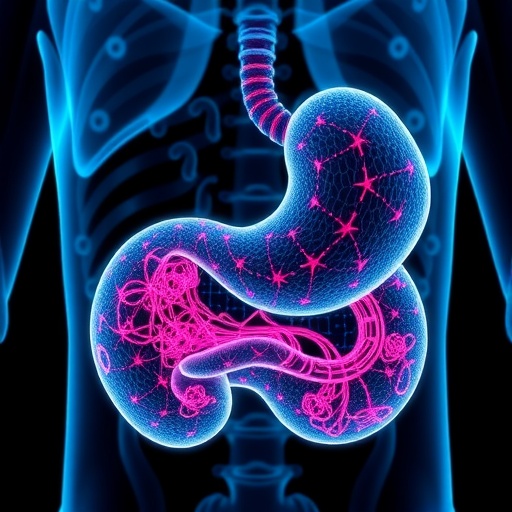In a surprising turn of events in cancer research, a recent study once hailed for its potential breakthrough in understanding gastric cancer has been officially retracted, sending ripples through the scientific community. The article, initially published in BMC Cancer and authored by a team led by Qin Hui Sun and colleagues, explored the role of miR-874, a microRNA, in inhibiting the proliferation of gastric cancer cells by targeting the SPAG9 gene. This retraction raises important questions about the integrity of scientific research and the processes involved in validating experimental results.
MicroRNAs (miRNAs) have been at the forefront of cancer biology due to their capability to regulate gene expression post-transcriptionally, impacting tumor growth and metastasis. miR-874 was previously reported to act as a tumor suppressor in gastric cancer by modulating SPAG9, a gene involved in cellular signaling pathways critical for cancer progression. Such findings fueled hopes for novel therapeutic strategies directed against gastric cancer, one of the leading causes of cancer-related deaths worldwide.
The initial study, which garnered notable attention, provided mechanistic insights indicating that miR-874 suppresses gastric cancer cell proliferation by directly targeting the mRNA of SPAG9, leading to reduced protein expression. SPAG9 (Sperm-associated antigen 9) is known to be implicated in oncogenic signaling, particularly within the MAPK and JNK pathways, which are integral to cancer cell survival and invasion. Targeting such pathways has been a promising approach in cancer therapy.
However, the validity of the experimental data underlying these exciting conclusions has come under scrutiny. The retraction notice indicates that the findings could not be reliably reproduced and that key aspects of the methodology or data integrity may have been compromised. Retractions like this, while unfortunate, are a vital part of scientific self-correction, ensuring that the body of literature remains as accurate and trustworthy as possible.
Transparency in research and rigorous peer review are cornerstones of scientific advancement. Missteps, whether intentional or accidental, can mislead further study efforts and waste valuable resources. This episode highlights the importance of replicability and open data sharing in biomedical research, particularly when dealing with complex diseases such as cancer.
The team involved in the original work hailed from several prestigious Chinese institutions, including the Department of Gastrointestinal Surgery at Shandong Provincial Hospital and affiliated medical universities. Correspondence related to the study was directed to Shuai Kong, a key contact for inquiries about the research. Despite the collaborative effort by a range of experts specializing in gastrointestinal surgery, respiratory medicine, and clinical operations, the study’s conclusions could not withstand critical re-examination.
Beyond impacting this specific investigation into miR-874 and SPAG9, this development underscores the challenges inherent in cancer research at the molecular level. Cancer’s multifaceted nature and the intricate networks of gene regulation demand exceedingly precise and reproducible experiments. It reminds researchers and clinicians alike to maintain a cautious interpretation of early results and to pursue findings with rigorous validation.
Furthermore, the retraction serves as a learning moment for the broader scientific community, emphasizing ethical standards and the vigilance required in managing data integrity. It reiterates that high-impact results require thorough verification through independent replication before influencing clinical practice or policy.
It remains essential to continue exploring the molecular drivers of gastric cancer, a malignancy with poor prognosis and limited treatment options. MicroRNAs, including miR-874, remain of considerable interest as potential biomarkers or therapeutic targets. The withdrawal of a single study does not negate the field’s overall progress but rather calls for strengthened methodologies and collaborative verification.
Future research will need to incorporate advanced genomic editing tools, improved in vitro and in vivo models, and stringent data transparency to bolster confidence in emerging hypotheses. Integrating multi-omics approaches might illuminate the precise roles of microRNAs and their gene targets more robustly.
In conclusion, this retraction, while disappointing, exemplifies the dynamic and self-correcting nature of science. The quest to decode gastric cancer’s complexities continues, driven by a global community committed to truthful, replicable, and transformative research. As investigations progress with renewed rigor, the ultimate goal remains unchanged: to devise effective therapies that improve survival and quality of life for gastric cancer patients worldwide.
Subject of Research: MicroRNAs in gastric cancer, gene regulation, SPAG9 targeting, cancer cell proliferation inhibition
Article Title: Retraction Note: miR-874 inhibits gastric cancer cell proliferation by targeting SPAG9
Article References:
Sun, Q.H., Yin, Z.X., Li, Z. et al. Retraction Note: miR-874 inhibits gastric cancer cell proliferation by targeting SPAG9. BMC Cancer 25, 1658 (2025). https://doi.org/10.1186/s12885-025-15199-1
Image Credits: Scienmag.com
Tags: cancer biology advancementscancer research retractionexperimental validation in sciencegastric cancer cell proliferationgene expression regulationimpact of retractions on scientific integritymicroRNA role in cancer researchmiR-874 in gastric cancerSPAG9 gene targetingtherapeutic strategies for gastric cancertumor suppressor mechanismsunderstanding microRNA functions





